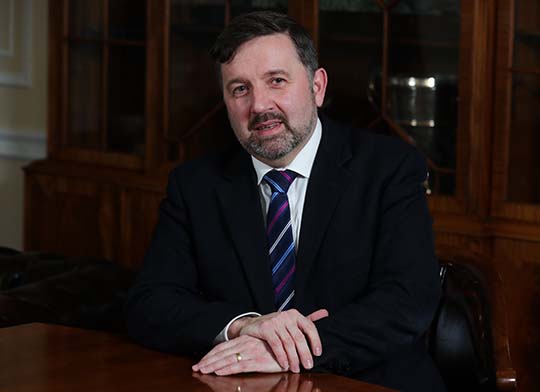Health Minister publishes new ten year Cancer Strategy
A strategy that aims to deliver top class outcomes for people in Northern Ireland diagnosed with cancer has today been launched by Health Minister Robin Swann.
In an important step forward for a key goal in the Strategy, the Minister revealed the locations for two prototype Rapid Diagnosis Centres which will serve patients from across Northern Ireland.
These will be established at Whiteabbey Hospital in Newtownabbey and South Tyrone Hospital in Dungannon. Work will now begin on making the plans a reality, with a view to welcoming their first patients later this year.
Launching the Cancer Strategy during a visit to the South Tyrone Hospital, Minister Swann said: “Unfortunately cancer will impact on all our lives at some point either directly or indirectly.
“Therefore the central vision of the new strategy is to ensure that everyone in Northern Ireland, wherever they live, has equitable and timely access to the most effective, evidence-based referral, diagnosis, treatment, support and person centred cancer care.

“Regrettably cancer services were challenged before the pandemic and there continues to be significant capacity and workforce challenges across a range of areas. Therefore there is a need to move forward urgently to implement the actions outlined in this Strategy to rebuild and transform our services in the short, medium and longer term.”
The new Strategy sets out 60 high-level recommendations that will enable significant strategic changes to be taken forward over the next decade. The recommendations cut across four key themes:
- Theme 1: Preventing Cancer – reduce the growth in the number of people diagnosed with preventable cancers
- Theme 2: Diagnosing and Treating Cancer – to improve survival
- Theme 3: Supporting People to Live and Die Well – to improve the experience of people diagnosed with cancer
- Theme 4: Implementing the Strategy
The Health Minister also said the Rapid Diagnosis Centres are an example of one of the short-term commitments within the Strategy being progressed. He explained: “The Rapid Diagnosis Centres will be piloted at both the South Tyrone Hospital and the Whiteabbey Hospital and will enable patients from across Northern Ireland who have non-specific but concerning symptoms to get diagnosis support when they do not meet the criteria for red flag referral.”
The Strategy is published alongside a Funding Plan outlining the estimated indicative cost of developing, establishing and maintaining the services and interventions set out in the Cancer Recovery Plan and Cancer Strategy. The Funding Plan identifies an estimated investment need of around £2.3m in the first year and in the region of £145m per year when all actions are implemented. A capital one-off investment of circa £73m is also required.
Minister Swann added: “Addressing the challenges currently facing cancer services in Northern Ireland, and implementing the strategic improvements greatly needed and so long sought for, is dependent on the availability of significantly increased and sustained funding. Unfortunately, cancer services in Northern Ireland have historically been underfunded in comparison with other UK jurisdictions.”
The strategy was developed by co-production and brought together people with lived experience of cancer, cancer charities, healthcare professionals from across all Health and Social Care Trusts, the Public Health Agency (PHA), the Health and Social Care Board (HSCB), Primary Care, and policy makers.
Acknowledging all those who contributed to the process, Minister Swann, said: “I want to take this opportunity to thank everyone who took the time to respond to the consultation. Without a doubt, your input has helped shape the final strategy and its recommendations.”
The Health Minister also highlighted recent and ongoing initiatives in cancer care, including a £10 million grant scheme set up last year. This has enabled important work by charities in such areas as awareness campaigns; screening services; rehab and prehab services; mental health counselling, online support for people affected by cancer; and teenage and young adult schemes.
“I have also committed annual recurrent investment of £2m to fund the recruitment of additional staff in oncology services. This service has been under significant pressures for a number of years, and the additional funding will help in improving the ability to recruit staff,” he added.
The Cancer Strategy for Northern Ireland 2022-2032 can be accessed on:

























